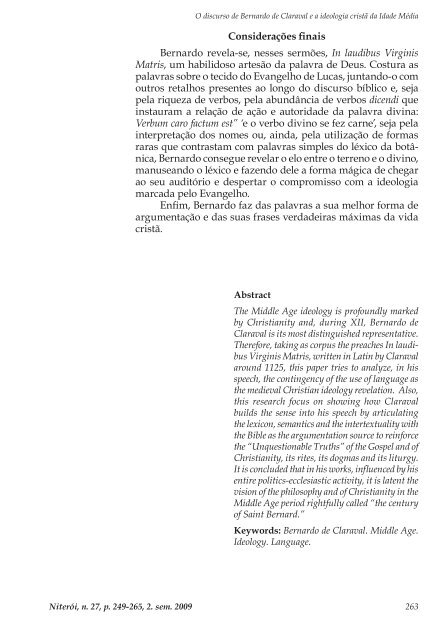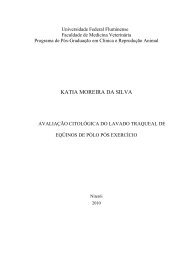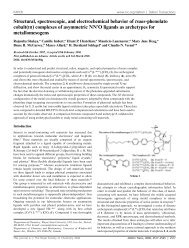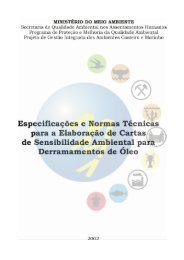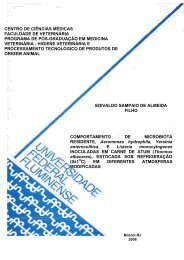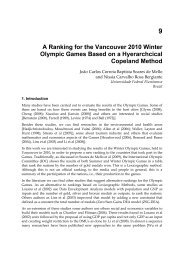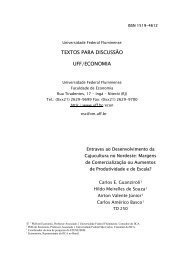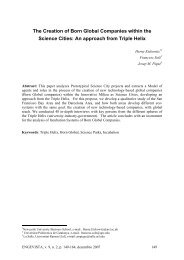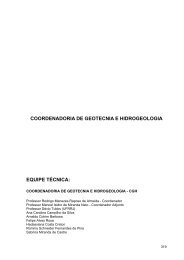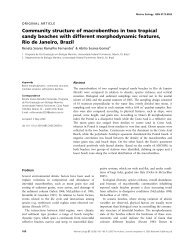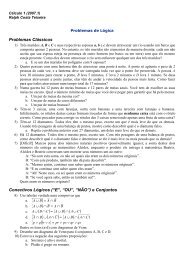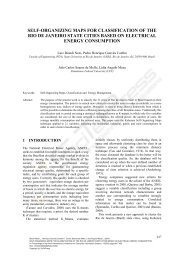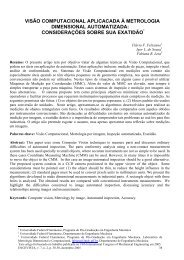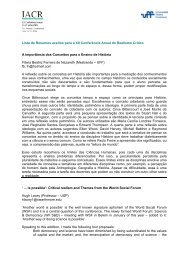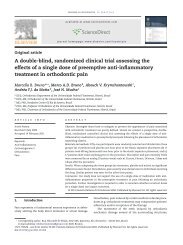- Page 1 and 2:
GraGoatá n. 27 2o semestre 2009 Po
- Page 3 and 4:
GraGoatá n. 27 2º semestre de 201
- Page 5 and 6:
Niterói, n. 27, p. 5-9, 2. sem. 20
- Page 7 and 8:
Niterói, n. 27, p. 5-9, 2. sem. 20
- Page 9:
Niterói, n. 27, p. 5-9, 2. sem. 20
- Page 12 and 13:
Gragoatá Inocência Mata 2 E nem o
- Page 14 and 15:
Gragoatá Inocência Mata 3 Utilizo
- Page 16 and 17:
Gragoatá Inocência Mata 7 Vergíl
- Page 18 and 19:
Gragoatá Inocência Mata 18 seduzi
- Page 20 and 21:
Gragoatá Inocência Mata 13 Public
- Page 22 and 23:
Gragoatá Inocência Mata 14 Ver: o
- Page 24 and 25:
Gragoatá Inocência Mata 16 Leia-s
- Page 26 and 27:
Gragoatá Inocência Mata 18 advér
- Page 28 and 29:
Gragoatá Inocência Mata 28 eram d
- Page 30 and 31:
Gragoatá Inocência Mata 30 CrISt
- Page 33 and 34:
Linguística Aplicada como lugar de
- Page 35 and 36:
2 U s o a p a l a v r a ‘discurso
- Page 37 and 38:
Linguística aplicada como lugar de
- Page 39 and 40:
Linguística aplicada como lugar de
- Page 41 and 42:
3 Na transcrição, utilizei as seg
- Page 43 and 44:
Linguística aplicada como lugar de
- Page 45 and 46:
Linguística aplicada como lugar de
- Page 47 and 48:
Linguística aplicada como lugar de
- Page 49 and 50:
Linguística aplicada como lugar de
- Page 51 and 52:
Uma Dobra (Neo)Barroca: Modernidade
- Page 53 and 54:
2 Cfr. para um apaixonado depoiment
- Page 55 and 56:
5 Umberto Eco, aliás, reflectindo
- Page 57 and 58:
Uma Dobra (Neo)barroca: Modernidade
- Page 59 and 60:
Uma Dobra (Neo)barroca: Modernidade
- Page 61 and 62:
Uma Dobra (Neo)barroca: Modernidade
- Page 63 and 64:
8 Cfr. o «depoimento» de Décio P
- Page 65 and 66:
Uma Dobra (Neo)barroca: Modernidade
- Page 67 and 68:
Uma Dobra (Neo)barroca: Modernidade
- Page 69 and 70:
Uma Dobra (Neo)barroca: Modernidade
- Page 71 and 72:
Uma Dobra (Neo)barroca: Modernidade
- Page 73 and 74:
Continuação nota 14 le plaisir es
- Page 75 and 76:
Uma Dobra (Neo)barroca: Modernidade
- Page 77 and 78:
Uma Dobra (Neo)barroca: Modernidade
- Page 79 and 80:
Uma Dobra (Neo)barroca: Modernidade
- Page 81 and 82:
Contingência e expressão: o conce
- Page 83 and 84:
Contingência e expressão: o conce
- Page 85 and 86:
Contingência e expressão: o conce
- Page 87 and 88:
Contingência e expressão: o conce
- Page 89 and 90:
3 a apresentação que se faz do co
- Page 91 and 92:
Contingência e expressão: o conce
- Page 93 and 94:
Contingência e expressão: o conce
- Page 95 and 96:
Contingência e expressão: o conce
- Page 97 and 98:
A contingência das ordens: a liter
- Page 99 and 100:
A contingência das ordens: a liter
- Page 101 and 102:
A contingência das ordens: a liter
- Page 103 and 104:
A contingência das ordens: a liter
- Page 105 and 106:
A contingência das ordens: a liter
- Page 107 and 108:
A contingência das ordens: a liter
- Page 109 and 110:
A contingência das ordens: a liter
- Page 111 and 112:
A contingência das ordens: a liter
- Page 113 and 114:
A contingência das ordens: a liter
- Page 115:
A contingência das ordens: a liter
- Page 118 and 119:
Gragoatá Anna Christina Bentes 2
- Page 120 and 121:
Gragoatá Anna Christina Bentes 120
- Page 122 and 123:
Gragoatá Anna Christina Bentes 122
- Page 124 and 125:
Gragoatá Anna Christina Bentes 4 a
- Page 126 and 127:
Gragoatá Anna Christina Bentes 126
- Page 128 and 129:
Gragoatá Anna Christina Bentes 128
- Page 130 and 131:
Gragoatá Anna Christina Bentes 130
- Page 132 and 133:
Gragoatá Anna Christina Bentes 132
- Page 134 and 135:
Gragoatá Anna Christina Bentes 134
- Page 136 and 137:
Gragoatá Kelvin dos Santos Falcão
- Page 138 and 139:
Gragoatá Kelvin dos Santos Falcão
- Page 140 and 141:
Gragoatá Kelvin dos Santos Falcão
- Page 142 and 143:
Gragoatá Kelvin dos Santos Falcão
- Page 144 and 145:
Gragoatá Kelvin dos Santos Falcão
- Page 146 and 147:
Gragoatá Kelvin dos Santos Falcão
- Page 148 and 149:
Gragoatá Kelvin dos Santos Falcão
- Page 150 and 151:
Gragoatá Kelvin dos Santos Falcão
- Page 152 and 153:
Gragoatá Kelvin dos Santos Falcão
- Page 155 and 156:
Entre o poder e o dever: fatores in
- Page 157 and 158:
Entre o poder e o dever: fatores in
- Page 159 and 160:
Entre o poder e o dever: fatores in
- Page 161 and 162:
Entre o poder e o dever: fatores in
- Page 163 and 164:
Entre o poder e o dever: fatores in
- Page 165 and 166:
Entre o poder e o dever: fatores in
- Page 167 and 168:
Entre o poder e o dever: fatores in
- Page 169 and 170:
El otro exílio de Eva: imaginario
- Page 171 and 172:
El otro exílio de Eva: imaginario
- Page 173 and 174:
El otro exílio de Eva: imaginario
- Page 175 and 176:
El otro exílio de Eva: imaginario
- Page 177 and 178:
El otro exílio de Eva: imaginario
- Page 179 and 180:
El otro exílio de Eva: imaginario
- Page 181 and 182:
El otro exílio de Eva: imaginario
- Page 183 and 184:
El otro exílio de Eva: imaginario
- Page 185 and 186:
El otro exílio de Eva: imaginario
- Page 187:
El otro exílio de Eva: imaginario
- Page 190 and 191:
Gragoatá Fernanda Correa Silveira
- Page 192 and 193:
Gragoatá Fernanda Correa Silveira
- Page 194 and 195:
Gragoatá Fernanda Correa Silveira
- Page 196 and 197:
Gragoatá Fernanda Correa Silveira
- Page 198 and 199:
Gragoatá Fernanda Correa Silveira
- Page 200 and 201:
Gragoatá Fernanda Correa Silveira
- Page 202 and 203:
Gragoatá Fernanda Correa Silveira
- Page 204 and 205:
Gragoatá Fernanda Correa Silveira
- Page 206 and 207:
Gragoatá Virgínia Boechat 206 “
- Page 208 and 209:
Gragoatá Virgínia Boechat 208 Par
- Page 210 and 211:
Gragoatá Virgínia Boechat 210 a e
- Page 212 and 213: Gragoatá Virgínia Boechat 212 “
- Page 214 and 215: Gragoatá Virgínia Boechat 214 o e
- Page 216 and 217: Gragoatá Virgínia Boechat 216 Em
- Page 218 and 219: Gragoatá Virgínia Boechat 218 Ref
- Page 220 and 221: Gragoatá Lucrécio Araújo de Sá
- Page 222 and 223: Gragoatá Lucrécio Araújo de Sá
- Page 224 and 225: Gragoatá Lucrécio Araújo de Sá
- Page 226 and 227: Gragoatá Lucrécio Araújo de Sá
- Page 228 and 229: Gragoatá Lucrécio Araújo de Sá
- Page 230 and 231: Gragoatá Lucrécio Araújo de Sá
- Page 232 and 233: Gragoatá Lucrécio Araújo de Sá
- Page 234 and 235: Gragoatá Lucrécio Araújo de Sá
- Page 236 and 237: Gragoatá Anita Costa Malufe 236 Po
- Page 238 and 239: Gragoatá Anita Costa Malufe 238 E
- Page 240 and 241: Gragoatá Anita Costa Malufe 1 a id
- Page 242 and 243: Gragoatá Anita Costa Malufe 242 em
- Page 244 and 245: Gragoatá Anita Costa Malufe 2 “
- Page 246 and 247: Gragoatá Anita Costa Malufe 246 o
- Page 248 and 249: Gragoatá Anita Costa Malufe 248 .
- Page 250 and 251: Gragoatá Jaciara Ornélia Nogueira
- Page 252 and 253: Gragoatá Jaciara Ornélia Nogueira
- Page 254 and 255: Gragoatá Jaciara Ornélia Nogueira
- Page 256 and 257: Gragoatá Jaciara Ornélia Nogueira
- Page 258 and 259: Gragoatá Jaciara Ornélia Nogueira
- Page 260 and 261: Gragoatá Jaciara Ornélia Nogueira
- Page 264 and 265: Gragoatá Jaciara Ornélia Nogueira
- Page 267: Resenha
- Page 270 and 271: Gragoatá Victor de Oliveira Pinto
- Page 272 and 273: Gragoatá Victor de Oliveira Pinto
- Page 274 and 275: Gragoatá Victor de Oliveira Pinto
- Page 276 and 277: 276 INOCÊNCIA MATA Docente na Facu
- Page 278 and 279: 278 VINCENZO RUSSO Licenciado e dou
- Page 280 and 281: 280 7 as ilustrações deverão ter
- Page 282: 282 7. Papers should contain two ab


